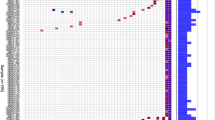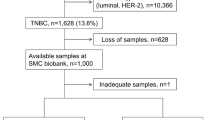Summary
Introduction Germline BRCA mutations may have therapeutic implications as surrogate markers of DNA-damage repair status in pancreatic ductal adenocarcinoma (PDAC). We performed a prospective study to evaluate the efficiency of risk criteria based on personal or family history of breast and ovarian cancer for determining germline BRCA mutations in PDAC patients with Asian ethnicity. Methods Between November 2015 and May 2016, we screened consecutive PDAC patients with locally advanced unresectable or metastatic disease who were referred for systemic chemotherapy. Analyses for germline BRCA mutations were performed if patients had one or more first-degree or second-degree relatives with breast or ovarian cancers or had a personal medical history of these diseases. DNA was extracted from whole blood, and all coding exons and their flanking intron regions of BRCA1 and BRCA2 were sequenced. Results A total of 175 patients were screened for personal and family history and 10 (5.7%) met the inclusion criteria for genetic sequencing. Pathogenic germline BRCA2 mutation [c.7480C>T (p.Arg2494*)] was identified in one male patient, resulting in a frequency of 10% for the risk-stratified patients and 0.6% for the unselected PDAC population. Two patients had germline BRCA2 variants of uncertain significance [c.1744A>C (p.Thr582Pro) and c.68-7T>A]. Conclusion Personal or family history of breast or ovarian cancers is a feasible, cost-effective risk categorization for screening germline BRCA mutations in Asian PDAC patients as 10% of this population had the pathogenic mutation herein. Future validation from a large, prospective cohort is needed.

Similar content being viewed by others
References
Siegel R, Ma J, Zou Z, Jemal A (2014) Cancer statistics, 2014. CA Cancer J Clin 64(1):9–29
Heestand GM, Murphy JD, Lowy AM (2015) Approach to patients with pancreatic cancer without detectable metastases. J Clin Oncol 33(16):1770–1778
Neoptolemos JP, Stocken DD, Friess H, Bassi C, Dunn JA, Hickey H et al (2004) A randomized trial of chemoradiotherapy and chemotherapy after resection of pancreatic cancer. N Engl J Med 350(12):1200–1210
Neoptolemos JP, Stocken DD, Bassi C, Ghaneh P, Cunningham D, Goldstein D et al (2010) Adjuvant chemotherapy with fluorouracil plus folinic acid vs gemcitabine following pancreatic cancer resection: a randomized controlled trial. JAMA 304(10):1073–1081
Oettle H, Neuhaus P, Hochhaus A, Hartmann JT, Gellert K, Ridwelski K et al (2013) Adjuvant chemotherapy with gemcitabine and long-term outcomes among patients with resected pancreatic cancer: the CONKO-001 randomized trial. JAMA 310(14):1473–1481
Conroy T, Desseigne F, Ychou M, Bouche O, Guimbaud R, Becouarn Y et al (2011) FOLFIRINOX versus gemcitabine for metastatic pancreatic cancer. N Engl J Med 364(19):1817–1825
Shridhar R, Almhanna K, Hoffe SE, Fulp W, Weber J, Chuong MD et al (2013) Increased survival associated with surgery and radiation therapy in metastatic gastric cancer: a surveillance, epidemiology, and end results database analysis. Cancer 119(9):1636–1642
Brand RE, Lynch HT (2000) Hereditary pancreatic adenocarcinoma. A clinical perspective. Med Clin North Am 84(3):665–675
Carnevale J, Ashworth A (2015) Assessing the significance of BRCA1 and BRCA2 mutations in pancreatic cancer. J Clin Oncol 33(28):3080–3081
Breast Cancer Linkage C (1999) Cancer risks in BRCA2 mutation carriers. J Natl Cancer Inst 91(15):1310–1316
Thompson D, Easton DF (2002) Breast cancer linkage C. Cancer incidence in BRCA1 mutation carriers. J Natl Cancer Inst 94(18):1358–1365
Levy-Lahad E, Catane R, Eisenberg S, Kaufman B, Hornreich G, Lishinsky E et al (1997) Founder BRCA1 and BRCA2 mutations in Ashkenazi Jews in Israel: frequency and differential penetrance in ovarian cancer and in breast-ovarian cancer families. Am J Hum Genet 60(5):1059–1067
Petrucelli N, Daly MB, Feldman GL (2010) Hereditary breast and ovarian cancer due to mutations in BRCA1 and BRCA2. Genet Med 12(5):245–259
Maxwell KN, Domchek SM, Nathanson KL, Robson ME (2016) Population frequency of germline BRCA1/2 mutations. J Clin Oncol 34(34):4183–4185
Kaufman B, Shapira-Frommer R, Schmutzler RK, Audeh MW, Friedlander M, Balmana J et al (2015) Olaparib monotherapy in patients with advanced cancer and a germline BRCA1/2 mutation. J Clin Oncol 33(3):244–250
Waddell N, Pajic M, Patch AM, Chang DK, Kassahn KS, Bailey P et al (2015) Whole genomes redefine the mutational landscape of pancreatic cancer. Nature 518(7540):495–501
Golan T, Kanji ZS, Epelbaum R, Devaud N, Dagan E, Holter S et al (2014) Overall survival and clinical characteristics of pancreatic cancer in BRCA mutation carriers. Br J Cancer 111(6):1132–1138
Lucas AL, Frado LE, Hwang C, Kumar S, Khanna LG, Levinson EJ et al (2014) BRCA1 and BRCA2 germline mutations are frequently demonstrated in both high-risk pancreatic cancer screening and pancreatic cancer cohorts. Cancer 120(13):1960–1967
Hahn SA, Greenhalf B, Ellis I, Sina-Frey M, Rieder H, Korte B et al (2003) BRCA2 germline mutations in familial pancreatic carcinoma. J Natl Cancer Inst 95(3):214–221
Couch FJ, Johnson MR, Rabe KG, Brune K, de Andrade M, Goggins M et al (2007) The prevalence of BRCA2 mutations in familial pancreatic cancer. Cancer Epidemiol Biomark Prev 16(2):342–346
Caro M, Verlaan MG, Julian O, Finkers R, Wolters AM, Hutton SF et al (2015) Assessing the genetic variation of ty-1 and ty-3 alleles conferring resistance to tomato yellow leaf curl virus in a broad tomato germplasm. Mol Breed 35(6):132
Holter S, Borgida A, Dodd A, Grant R, Semotiuk K, Hedley D et al (2015) Germline BRCA mutations in a large clinic-based cohort of patients with pancreatic adenocarcinoma. J Clin Oncol 33(28):3124–3129
Cho JH, Bang S, Park SW, Chung JB, Song SY (2008) BRCA2 mutations as a universal risk factor for pancreatic cancer has a limited role in Korean ethnic group. Pancreas 36(4):337–340
Daly MB, Pilarski R, Axilbund JE, Berry M, Buys SS, Crawford B et al (2016) Genetic/familial high-risk assessment: breast and ovarian, version 2.2015. J Natl Compr Cancer Netw 14(2):153–162
Gloria M. Petersen KGC, Robert R. McWilliams, Neil Majithia, Brian Allen, John Kidd, Nanda Singh, Anne-Renee Hartman, Ann L. Oberg (2016). Mayo Clinic, Rochester, MN; Myriad Genetics, Inc., Salt Lake City, UT. Genetic heterogeneity and survival among pancreatic adenocarcinoma (PDAC) patients with positive family history. In: 2016 ASCO Annual Meeting: J Clin Oncol
Golan T, Sela T, Margalit O, Amit U, Halpern N, Aderka D, et al. Short and long-term survival in metastatic pancreatic adenocarcinoma, 1993–2013. J Clin Oncol 2017;35(4_suppl):232–232
Salo-Mullen EE, O'Reilly EM, Kelsen DP, Ashraf AM, Lowery MA, Yu KH et al (2015) Identification of germline genetic mutations in patients with pancreatic cancer. Cancer 121(24):4382–4388
Takai E, Yachida S, Shimizu K, Furuse J, Kubo E, Ohmoto A et al (2016) Germline mutations in Japanese familial pancreatic cancer patients. Oncotarget 7(45):74227–74235
Author information
Authors and Affiliations
Corresponding authors
Ethics declarations
Funding
This study was supported by a grant (2015–0753) from the Asan Institute for Life Sciences, Asan Medical Center, Seoul, Korea.
Conflict of interest
The authors indicate no potential conflicts of interest.
Ethical approval
All procedures performed in studies involving human participants were in accordance with the ethical standards of the institutional and/or national research committee and with the 1964 Helsinki declaration and its later amendments or comparable ethical standards.
Informed consent
This study was approved by the Institutional Review Board of the Asan Medical Center and informed consent was obtained from all individual participants included in the study.
Rights and permissions
About this article
Cite this article
Lee, K., Yoo, C., Kim, Kp. et al. Germline BRCA mutations in Asian patients with pancreatic adenocarcinoma: a prospective study evaluating risk category for genetic testing. Invest New Drugs 36, 163–169 (2018). https://doi.org/10.1007/s10637-017-0497-1
Received:
Accepted:
Published:
Issue Date:
DOI: https://doi.org/10.1007/s10637-017-0497-1




